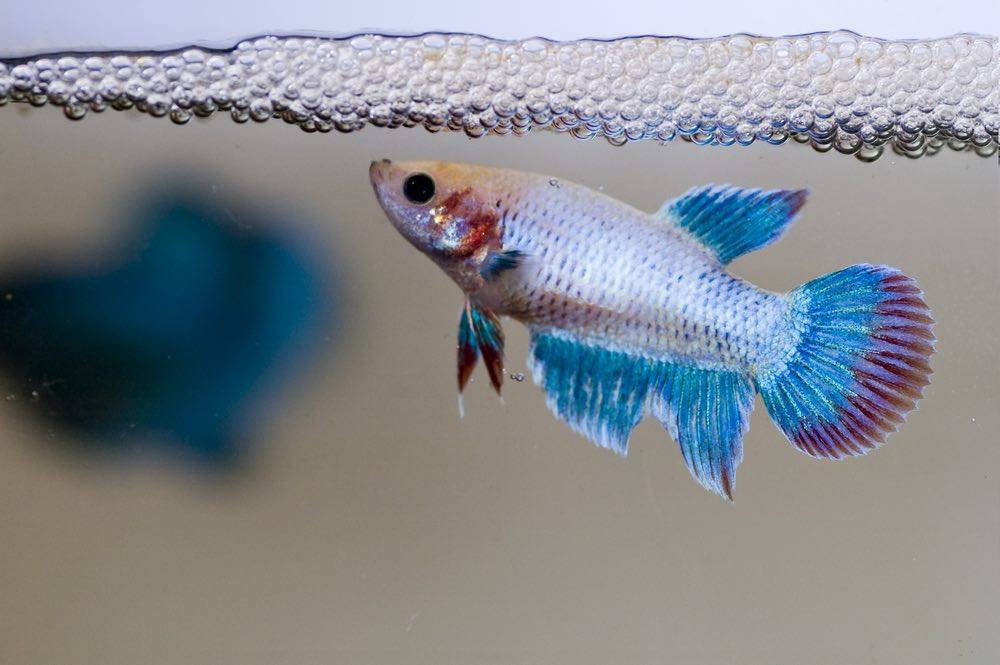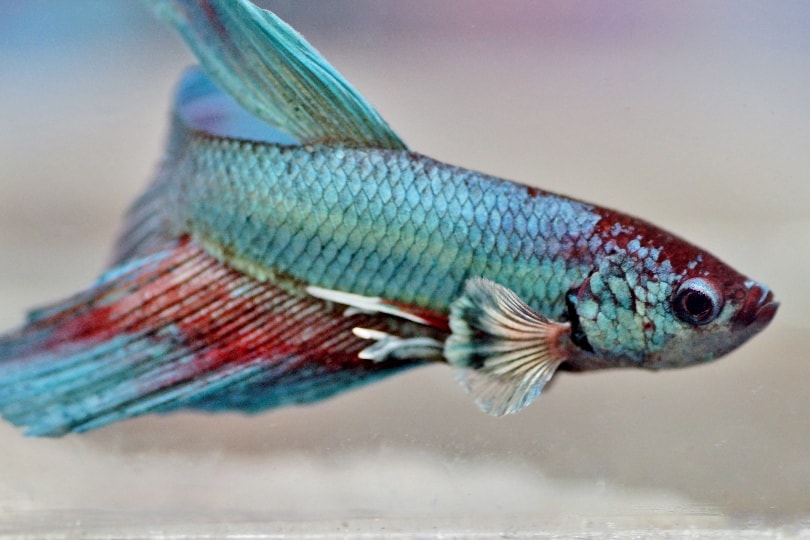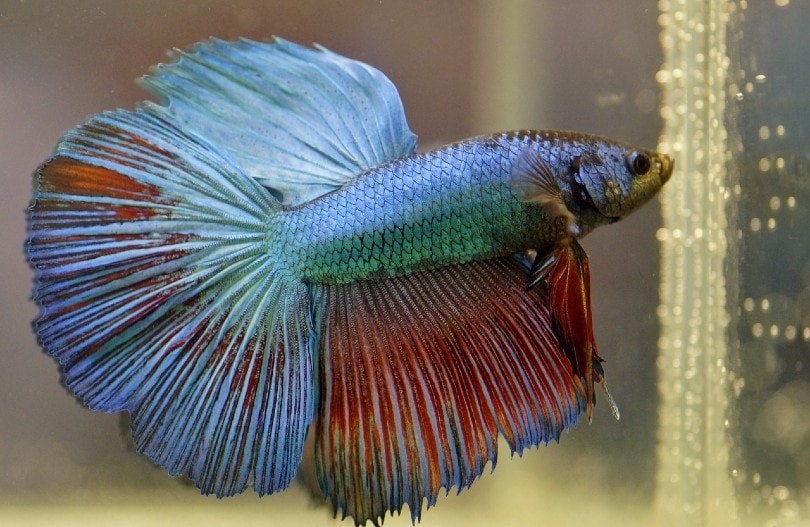Betta Fish Popeye: Causes, Signs, & Treatment Explained By Our Vet!
By Dr. Luqman Javed, DVM (Vet)
Updated on

Click to Skip Ahead
There are a variety of common diseases that infect betta fish, such as Velvet, fin rot, and buoyancy disorders. These diseases may sometimes be accompanied by signs involving your fish’s eyes. The most common eye pathology in bettas is a condition known as popeye. As the name suggests, this condition isn’t pretty and involves your fish’s eye (or both eyes) appearing “popped”.
Popeye can affect your betta’s quality of life, and treatment of its underlying cause should be started promptly when you notice any signs. Popeye can heal in some cases; however, the eye will not look how it did before.
This article will inform you about the main causes, signs, treatment, and even tips to avoid this condition from arising in the first place!
Popeye in Bettas Explained
Popeye (scientifically known as exophthalmos) is described as a condition that causes a fish’s eye to swell and bulge out. When compared to the healthy eye, the infected one can appear double the size. The name is an explanatory term for when the eye looks like it has popped out of the socket. It is sometimes also written as pop-eye.
Of key importance is distinguishing pop-eye from a disease. Pop-eye is, in a strict sense, not a disease in itself. Rather, it’s a sign that’s observed in bettas when there’s an underlying health issue or condition which can affect either one or both of your betta’s eyes.
The organs or tissues that are commonly associated with pop-eye include the sinuses around a fish’s eyes, the eyeball itself, or the various components of the eyeball (for example, the retina). Depending on the underlying cause of the condition (which we will discuss shortly), you might be able to observe involvement of other body parts as well (for example, your fish’s fins might not be looking healthy).
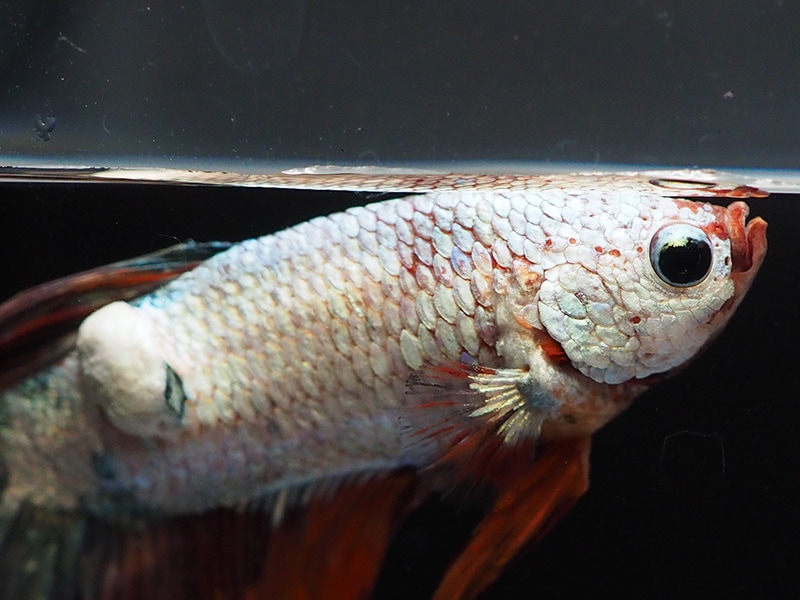
8 Main Causes of Popeye in Bettas
1. Poor Aquarium Maintenance
Dirty tank conditions are a breeding ground for all sorts of pathogens. If you do not keep up with tank maintenance and water changes, your betta can easily become infected by a number of different conditions. Many of these conditions can be accompanied with popeye as well. This is by far the most common cause of popeye in bettas. Many of the other causes also work in conjunction with poor husbandry and lack of aquarium housekeeping or maintenance.
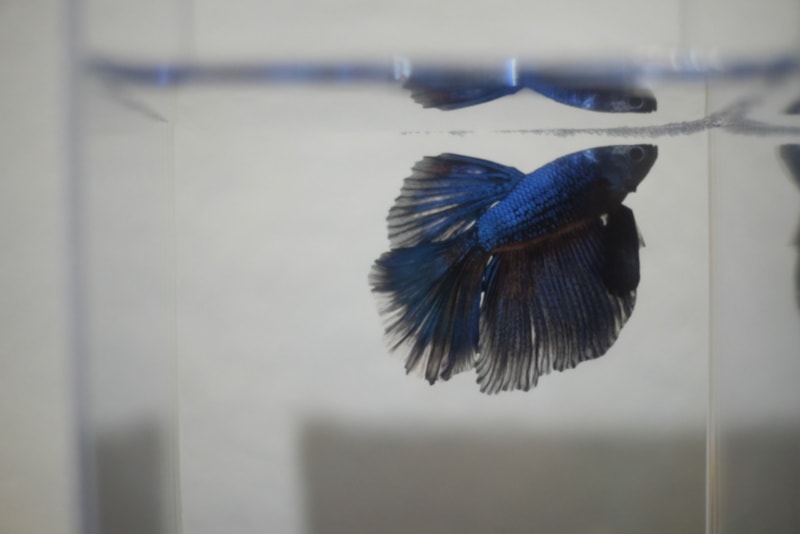
2. Incorrect Water Parameters
An often misunderstood concept of fishkeeping is that in essence, you don’t keep pet fish, but rather, pet water. In the simplest terms, taking care of the water ensures that your fish remain healthy. Conversely, incorrect water parameters for your fish often comprise their immune system, allowing for other diseases and conditions (including popeye) to set in.
3. Bacterial Infections
Bettas can develop bacterial infections either by living in poor or inappropriate housing conditions, or by new fish or invertebrates that have been added to the tank. This causes a nasty bacterial infection, which can also lead to popeye.

4. Fungal Infections
The transmission is the same as bacterial infections, but a fungal infection is usually a sign of a very immunocompromised fish in a very poorly maintained aquarium. This can be accompanied by white fluffy growths along the betta’s body.
5. Parasitic Diseases
Many parasites that can affect fish can lead to changes in the structure of their eye, resulting in popeye. In this case, the extent of the popeye often depends on your fish’s health status and the parasite burden in the aquarium.
6. Physical Injury
Your betta can injure their eyes if they swim into a hard object, get stuck in the filter, or if another fish attacks them. The eye may swell as a result.
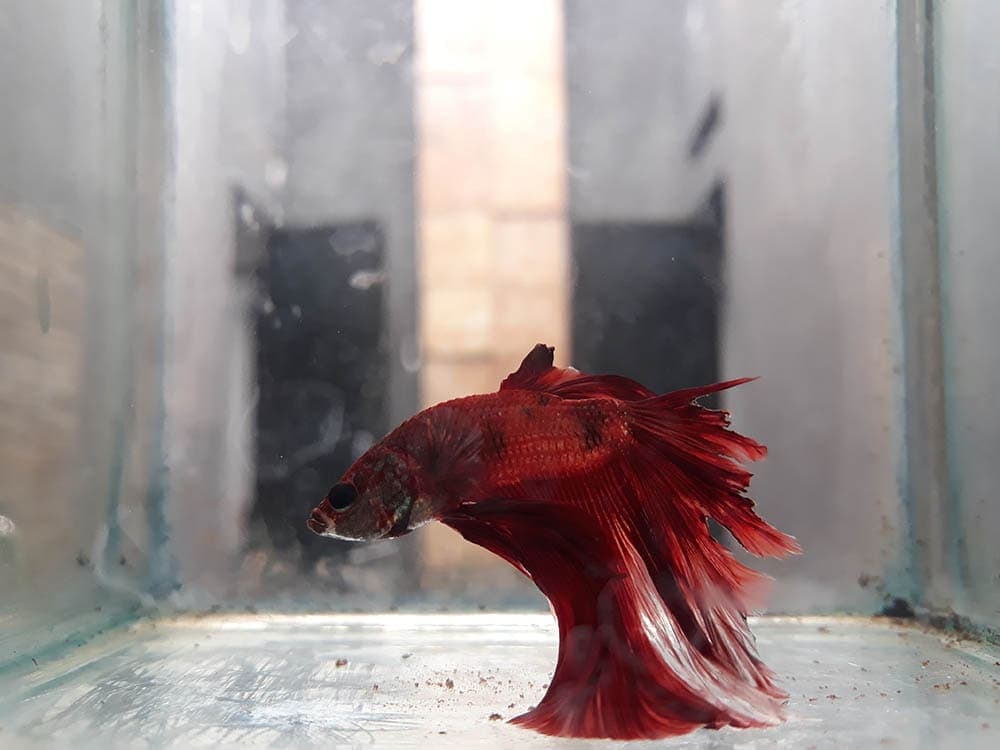
7. Gas Imbalance
An imbalance in aquarium gas levels can often result in popeye. This usually happens in planted aquariums, where inexperienced fish keepers suddenly infuse high amounts of oxygen or carbon dioxide into the water in an effort to promote better plant growth. A sudden change in the gas parameters of an aquarium can cause your fish’s eyes to swell or bulge out.
Gas imbalances can also occur because of sudden changes in water temperature or a sudden change in water chemistry after a water change (where a different or incorrect water source is used as a replacement for your aquarium). Gas imbalances can also occur if one overdoses an aquarium with salt (often in an attempt to treat another ailment).
8. Abnormal Growths
At times, an abnormal growth at or near your fish’s eye can lead to popeye. Examples of such growths include benign growths such as warts or tumors (also sometimes known as cancerous growths).
Signs of Popeye in Bettas
The signs of popeye itself are the following:
- Bubbles in the eyes or the eye socket
- Protruded eyes (or bulging eyes)
- Extruded eyes (eyes aren’t in their socket anymore)
Because popeye isn’t a disease itself but usually a sign that accompanies other diseases or conditions, you may notice other signs in your betta as well. These vary according to the underlying cause, and the list of these signs is very extensive. However, the most common signs you might observe in an unwell betta are the following:
- Redness around the eye
- Lethargy
- General unthrifty appearance (ragged fins and/or tail)
- Rubbing against objects
- Clamped fins
- Bottom sitting
- Inappetance or refusal to eat
- Change in color
- An abnormal growth on your betta’s body
- A protruded spine or a bent body shape
How to Effectively Treat Popeye
The general approach to treating popeye involves the following steps:
- Assessing the water quality of the aquarium
- Determining the cause of popeye
- Treating or fixing the underlying cause (if possible) and/or seeking professional help from an aquatic veterinarian for other causes (for example, to surgically treat a tumor)
- Establishing good long term husbandry practices to prevent recurrence.
Please note that popeye in many cases doesn’t resolve successfully, because it often develops as a result of prolonged exposure to a pathogen, and disease progression is often quite extensive by the time popeye is observed. Death is common in fish that have popeye (including bettas). It might be worth it to consult with an aquatic veterinarian for the option of humane euthanasia in some cases.
Water maintenance
Almost no medication intended for pet fish works if water conditions are suboptimal for your fish. Before beginning any treatment protocol, it is absolutely important to establish good water quality. To do this, you need a water testing kit. For Bettas, your water parameters should be as follows:
- Ammonia: 0 parts-per-million (ppm)
- Nitrite: 0 ppm
- Nitrates: under 15 ppm, ideally under 10 ppm.
In addition to the above, Bettas are very susceptible to illness if they’re in an aquarium of inappropriate temperature. They’re also somewhat susceptible to improper light exposures (either too much or too little).
- Bettas require an aquarium that’s at least 5 US gallons (approximately 19-20 liters) in volume.
- Water temperature should be at around 28°C (or 82.4 °F). This is also the ideal temperature for bettas to build bubble nests. This temperature also naturally reduces the viability of many pathogens, aiding in disease prevention and control.
- To accomplish this, it’s important to keep the ambient temperature of the room the aquarium is placed in slightly lower than this, at around 26 to 27°C (78.8 – 80.6 °F) and use a water heater to warm up the aquarium. You should not put the aquarium in a room warmer than 28°C, as this will cause the water temperature to be too warm for your betta.
- A 14:10 hour light:dark cycle, meaning 14 hours of day followed by 10 hours of darkness or night. It’s best to use fluorescent lights for providing your fish with controlled light exposure.
- A gentle filter. Sponge filters set at a “low” setting are the best for bettas. Bettas are not strong swimmers and can easily get stressed in strong filtration system currents.
Bettas can easily adapt to different pH levels (ranging from 5.0 – 9.0). However, the key is ensuring that you keep their pH levels consistent by sticking to the same water source.
If your water quality is suboptimal, the odds of any treatment working are very minimal to none. It’s also unethical to keep fish in a less-than-ideal environment. If your water parameters are suboptimal, you should do large water changes (35-50%) on a daily basis until you can consistently see acceptable levels of ammonia, nitrite, and nitrates in the aquarium.
Once you consistently see good water quality readings for 3 to 4 days, you can reduce these water change frequencies to 25-35% every three days (for fish being treated with medication), and a 20-25% change once per week for healthy fish.
In addition, if your aquarium’s filter has a chemical filtration component (usually in the form of activated charcoal), you should remove it from the filtration system while treating your fish. If left in, the charcoal will absorb most forms of medication you dose the tank with.
Medications
Treatment should be done as soon as you notice signs of Popeye and identify the cause properly (usually after the input of a veterinarian or fisheries expert). There are many effective medications for the successful treatment of various conditions, and these medications include:
- Seachem Kanaplex (for fungal and bacterial infections)
- Seachem Neoplex (antibiotic for external infections)
- API Melafix
- Methylene blue
- Nutrafin Betta Enviro-Clean (water maintenance)
- Seachem Metroplex (bacterial and protozoans)
Treatment should only be administered once you have discovered the root cause as to why your betta has developed Popeye. If it is a sudden occurrence with no other signs, it is most likely related to an injury, not an infectious cause. Once you have discovered the main cause of the condition, treatment should be administered promptly.
Removal of Hazards
If the Popeye was caused by bumping into a decoration, consider removing it from the aquarium and any other hard or potentially hazardous items from the tank. To test if aquarium decorations are safe for your Betta, a good test is to run a silk sock around the ornament or decoration. If it snags anywhere, then your betta can also get injured by the ornament, and you shouldn’t place it in your aquarium.
Generally speaking, live plants are the safest additions to a betta’s aquarium (however, they should be quarantined before being added into the aquarium). Please note that aquatic plants don’t tolerate aquarium salt well and can easily die from overexposure to it (normal doses for fish are usually lethal for many aquatic plants).
Prevention Methods
Prevention is always better than treatment. There are many ways to prevent Popeye from occurring, and here are a few:
- Do regular water changes. An average-sized betta tank (5–10 gallons) should have a 20% water change conducted once a week.
- Incorporate several live plants in the tank (ensure you quarantine them before adding them to the aquarium).
- Feed your betta a diet rich in protein and low in plant material.
- Keep the temperature at 28°C (or 82.4 °F) using a pre-set heater as explained in the treatment section of this article.
- Do not keep sharp or pointed objects in the tank.
- Only keep your betta with other small peaceful fish if you opt for a community tank. Please be mindful that community tanks need more water volume than what is required by just a lone betta.
- Quarantine new fish, invertebrates (snails & shrimp), and plants for 6 weeks before you place them with your betta. This minimizes the risk of transmitting diseases to your betta.
- Wash new tank supplies and items thoroughly before using them in the tank.
- Use separate equipment for each tank to avoid spreading pathogens from different tanks.
Conclusion
Popeye is the most common ocular condition in Bettas and is usually a sign of either poor husbandry, disease, injury, or a combination of the three. In some cases, treatment of the underlying cause of popeye may result in a cessation of the eye’s popped appearance, however, damage to the eye’s structure is often permanent. In some cases, fish with popeye do not survive and may perish. It’s therefore important to keep your betta in a well maintained, appropriate aquarium and maintain good quarantine and husbandry practices to ensure their health. As always, you should reach out to your aquatic veterinarian if you have any questions about your Betta’s health.
Featured Image Credit: BankZa, Shutterstock





